#Jarmila Novotna
Explore tagged Tumblr posts
Video
Jarmila Novotna by Truus, Bob & Jan too! Via Flickr: German postcard by Ross Verlag, no. 6837/1, 1931-1932. Photo: Walter Firner, Berlin. Czech soprano Jarmila Novotná (1907-1994) was one of the world-renowned opera luminaries of the 20th Century. Her film appearances were unfortunately few and far between. Jarmila Novotná was born in in Prague, Czech Republic in 1907. She studied singing with Emmy Destinn. In 1925, the 17-years-old Novotná made her operatic debut at the Prague Opera House as Marenka in Bedřich Smetana's Prodaná nevěsta (The Bartered Bride). Six days later, the lyric soprano sang there as Violetta in Giuseppe Verdi's La traviata. The following year, she made her film debut in the silent film Vyznavaci slunce/The Sun Disciples (Václav Binovec, 1926), starring Luigi Serventi. In 1928 she starred in Verona as Gilda opposite Giacomo Lauri-Volpi in Verdi's Rigoletto and at the Teatro San Carlo in Naples as Adina opposite Tito Schipa in Gaetano Donizetti's L'elisir d'amore. In 1929 she joined the Kroll Opera in Berlin, where she sang Violetta as well as the title roles of Giacomo Puccini's Manon Lescaut and Madama Butterfly. When talking pictures arrived, she headlined in German films like Brand in Der Oper/Fire in the Opera House (Carl Froelich, 1930), with Gustaf Gründgens, Der Bettelstudent/The Beggar Student (Victor Janson, 1931), and the film version of The Bartered Bride, Die Verkaufte Braut (Max Ophüls, 1932). Hal Erickson at AllMovie on Die Verkaufte Braut (1930): “The original libretto, involving the comic misadventures of two mismatched couples, is given a respectable amount of attention, but the film's biggest selling card is the photographic dexterity of Max Ophuls, who never met a camera crane he didn't like. Since filmed opera was seldom big box-office in 1932, Ophuls concentrates on the farcical elements of the story; especially worth noting are comic contributions by Paul Kemp and Otto Wernicke, who seldom let their German film fans down. Curiously, star Jarmila Novotna, whose ‘live’ appearances in The Bartered Bride were much prized by contemporary critics, doesn't come off all that well in this film version.” Other films followed such as Nacht Der Grossen Liebe/Night of the Great Love (Geza von Bolvary, 1933) with Gustav Fröhlich. In January 1933 she created the female lead in Jaromir Weinberger's new operetta Frühlingsstürme (Spring Storms), opposite Richard Tauber at the Theater im Admiralspalast, Berlin. This was the last new operetta produced in the Weimar Republic, and she and Tauber were both soon forced to leave Germany by the new Nazi regime. Jarmila Novotnà returned to Czechoslovakia to star in the film Skrivanci pisen/Lark's Songs (Svatopluk Innemann, 1933). In 1934, she left for Vienna, where she created the title role in Franz Lehár's operetta Giuditta opposite Richard Tauber. Her immense success in that role led to a contract with the Vienna State Opera, where she was named Kammersängerin. She also appeared there with Tauber in The Bartered Bride and Madama Butterfly. In the cinema, she starred in the Austrian operetta film Frasquita (Karel Lamac, 1934) with Heinz Ruhmann, the Austrian romantic thriller Der Kosak und die Nachtigall/The Cossack and the Nightingale (Phil Jutzi, 1935) with Iván Petrovich, and in the French-British operetta film La dernière valse/The Last Waltz (Leo Mittler, 1935), which was made in two language versions. She then left the film industry to concentrate on her stage work with the Viennese State Opera. After the Anschluss of Austria, she had to leave Vienna. In January 1940 she made her debut with the Metropolitan Opera in New York, as Mimí in Puccini's La bohème. From 1940 to 1956, Novotná performed regularly at the Met. In 1946 she returned before the cameras in a straight dramatic role in the Hollywood production The Search (Fred Zinnemann, 1946), starring Montgomery Clift. The Search is a semi-documentary film on the plight of WWII orphans. Novotná played a Czech mother who has lost contact with her young son when they were in Auschwitz and she now travels from one refugee camp to another in search of him. Novotna's then played turn of the century diva Maria Selka in the biopic The Great Caruso (Richard Thorpe, 1951), featuring Mario Lanza. The film traces legendary tenor Enrico Caruso's ascension from adolescent choir singer in Naples to the uppermost ranks of the opera world. Mario Lanza's tenor voice made this film one of the top box-office draws of 1951, and this helped to popularize opera among the general public. On TV she appeared in The Great Waltz (Max Liebman, 1955), which charts the life and times of composer Johann Strauss, Jr. She also played Hans’ mother in the TV musical Hans Brinker, or the Silver Skates (Sidney Lumet, 1958), starring Tab Hunter. Her last screen appearance was as an interviewee in the documentary Toscanini: The Maestro (Peter Rosen, 1985). At 85, Jarmila Novotná passed away in 1994 in New York. Sources: Hal Erickson (AllMovie), Wikipedia, and IMDb.
#Jarmila Novotna#Jarmila#Novotna#Actress#Actrice#European#Film Star#Cinema#Cine#Kino#Film#Picture#Screen#Movie#Movies#Filmster#Star#Vintage#Postcard#Carte#Postale#Cartolina#Tarjet#Postal#Postkarte#Postkaart#Briefkarte#Briefkaart#Ansichtskarte#Ansichtkaart
6 notes
·
View notes
Text
"The Search" (1948)
On TCM this AM. Made when UNRWA was not yet a cover for terrorists. The cast is wonderful: Montgomery Clift has never been more appealing, Aline McMahon is wonderful (I just ordered her recent bio), Wendell Corey does his usual superb supporting performance -- but the standouts are Jarmila Novotna (amazing to thing she was also an opera singer) and extraordinary Ivan Jandl
0 notes
Photo

@tcmparty live tweet schedule for the week beginning Monday, April 19, 2021. Look for us on Twitter…watch and tweet along…remember to add #TCMParty to your tweets so everyone can find them :) All times are Eastern.
Saturday, April 24 at 3:30 p.m.
THE SEARCH (1948)
An American soldier in post-war Europe becomes attached to a homeless child.
#schedule#fred zinnemann#montgomery clift#aline mcmahon#wendell corey#jarmila novotna#mary patton#ewart c. morrison#william rogers#ivan jandl#leopold borkowski#claude gambier#world war II#classic movies#classic film#turner classic movies#31 Days of Oscar#live tweet
20 notes
·
View notes
Text
Montgomery Clift on TCM 6/15
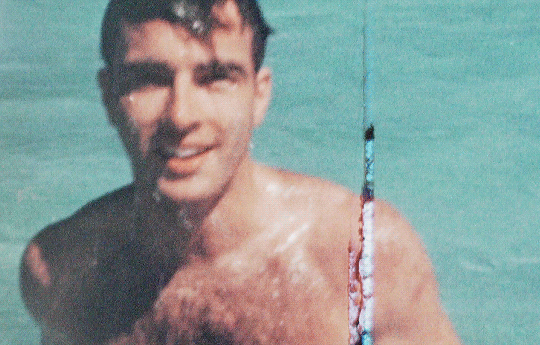
Turner Classic Movies has made their daytime theme on June 15th, the man, the myth, the legend, Montgomery Clift! I am extremely excited because I love Clift as an actor and have been learning more about the man he was too!
Some of these films I have seen, others will be my first watch! Here is the line up for Monty’s films on Monday!
6:30 AM - The Search

An American soldier in post-war Europe rescues a homeless child and becomes attached to him.
Also Starring - Ivan Jandl, Aline MacMahon, Wendell Corey, and Jarmila Novotna
DVR Alert - This film is one of my favorite Monty films because it shows how gentle a leading man can be. He also plays so well with the child actor Ivan Jandl, and the bond on the screen feels organic.
Fun Fact - Clift saved this film. He rewrote a lot of the script and made it better. Unfortunately, he isn’t credited for his contribution so he didn’t get to share in the joy of the film winning Best Writing for A Motion Picture Story at the Oscars.
8:30 AM - The Big Lift
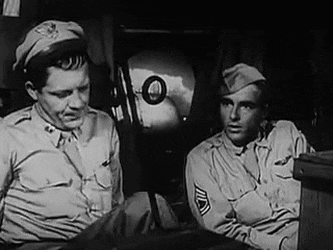
The story of two Air Force sergeants who find love while overseas to fly the Berlin Airlift.
Also Starring - Paul Douglas, Cornell Borchers, Bruni Löbel, and O.E. Hasse
Personal DVR Alert - I have never seen this film and excited to watch it for the first time!
Fun Fact - Monty was able to make this film because he dropped out of Sunset Blvd. Rumor has it, Libby Holman, his older actress lover, thought the film was too close to home and talked him out of doing it.
10:45 AM - I Confess
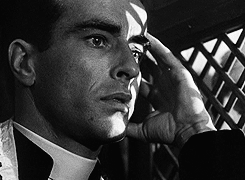
A priest is accused of murder and the only way to clear his is name is to break the seal of the confessional, which he won’t do.
Also Starring - Anne Baxter, Karl Malden, Brian Aherne, O.E. Hasse, and Dolly Haas
Hitchcock DVR Alert - This is a highly underrated Alfred Hitchcock film. It is so suspenseful because the audience knows the truth and is on edge the whole time.
Fun Fact - The movie doesn’t mirror the original play 100 percent. The reason is because the censors would have had a fit if the film depicted the priest and his lover having an illegitimate child and the priest being hung at the end.
12:30 PM - From Here to Eternity
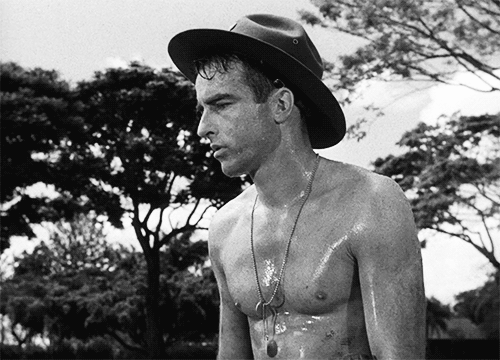
A private is punished by his captain for not boxing on his team’s unit and at the same time, the captain’s wife and second in command are having an affair.
Also Starring - Burt Lancaster, Deborah Kerr, Donna Reed, Frank Sinatra, Philip Ober, and Ernest Borgnine
A Must Watch DVR Alert - This is probably my favorite Monty film. The ensemble cast is fantastic and the story is just a very interesting one. Clift is also at his best in this film (not just physically, I promise haha). If you aren’t a fan of war films, watch this one. It is more character driven and is technically before the US joined the war.
Fun Fact - Clift was dedicated to his character Prewitt so much that he learned how to play the bugle (he was dubbed though) and took boxing lessons.
2:45 PM - Indiscretion of an American Housewife
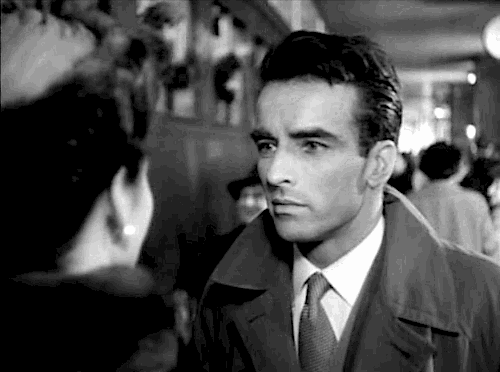
A married American woman tries to break off her affair with an Italian-American professor before she leaves Italy’s Stazione Termini - or Terminal Station.
Also Starring - Jennifer Jones, Gino Cervi, and Richard Beymer
Slight DVR Alert - The version being shown is the shorter version. I will explain in the Fun Fact section why there are two versions. I like the longer version better, but feel like both versions are worth a watch.
Fun Fact - Jennifer Jones’s husband, David O Selznick, decided to cut Director Vittorio De Sica’s version of this film for American audiences. Selznick’s version is 72 minutes and De Sica’s version is 89 minutes. The added time fleshes out some plot points and makes the film flow better.
4 PM - Raintree County
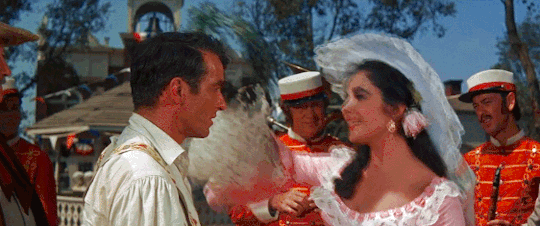
A man jilts his childhood love for a Southern Belle, but their relationship is a complicated one due to her past and the on-set of the Civil War.
Also Starring - Elizabeth Taylor, Eva Marie Saint, Nigel Patrick, Lee Marvin, and Rod Taylor
Eh DVR Alert - This film is beautifully filmed, but it is long and not very interesting. It has been a while since I last saw it, so maybe I need to revisit it.
Fun Fact - This was the film that Clift was making when he had his infamous car accident. It is noticeable what was shot pre-accident and what was shot post accident. Clift’s face changed a bit, due to surgeries.
#turner classic movies#tcm#montgomery clift#the search#ivan jandl#aline macmahon#wendell corey#jarmila novotna#the big lift#paul douglas#cornell borchers#bruni lobel#o.e. hasse#i confess#anne baxter#karl malden#brian aherne#dolly haas#from here to eternity#burt lancaster#donna reed#deborah kerr#frank sinatra#philip ober#ernest borgnine#indiscretion of an american wife#stazione termini#terminal station#jennifer jones#gino cervi
38 notes
·
View notes
Photo

Movies I saw in 2020
↳ The Search (1948)
2 notes
·
View notes
Photo

Jules Berry & Jarmila Novotná pour l'opérette La Chauve-Souris de Johann Strauss II, mise en scène de Max Reinhardt au Théâtre Pigalle (1933).
#Jules Berry#Jarmila Novotná#Jarmila Novotna#La Chauve Souris#Die Fledermaus#1933#1930s#Johann Strauss II#Max Reinhardt#Théâtre Pigalle#théâtre#*
5 notes
·
View notes
Video
youtube
Jaromir Weinberger: "Frühlingsstürme" (Operette) "Sitzt man nachts mit einer Frau beim Tee"
Jarmila Novotna, Sopran
4 notes
·
View notes
Photo

Czech Woman A Day (797) : Jarmila Novotná (opera singer, actress)
2 notes
·
View notes
Text
Voci nel Giorno della Memoria
Auschwitz. Il 27 gennaio 1945 le truppe sovietiche scoprirono gli orrori del campo di concentramento e di sterminio. Pochi sopravvissuti. Tra gli italiani, Primo Levi, Liliana Segre e Sami Modiano. Lì morì un numero imprecisato di esseri umani. Forse un milione. Forse un milione e mezzo. Cosa significa eliminare quasi un milione e mezzo di persone? Significa trasformare in deserto una città come…
View On WordPress
#Adolf Hitler#Aksel Schiøtz#Anni Frind#Arthur Schnabel#Arturo Toscanini#Auschwitz#Bruno Walter#Claretta Petacci#Covent Garden#Delia Reinhardt#Der Rosenkavalier#Emmy Bettendorf#Fernand Ansseau#Frda Leider#Fritz Busch#Gestapo#Giorno della Memoria#Herbert Janssen#Hermann Göring#Jarmila Novotna#Kerstin Thorborg#La traviata#Lauritz Melchior#Lina Pagliughi#Lotte Lehmann#Luigi Fort#Martial Singher#Max Hirzel#Metropolitan#Michael Bohnen
0 notes
Text
February 09 in Music History
1664 FP of Cavalli's opera Scipio Africanus at the Teatro Santi Giovanni e Paolo in Venice.
1740 Death of German composer, organist, Vincent Lübeck.
1744 Birth of composer Amos Bull.
1765 Death of English composer, soprano, organist, Elisabetta de Gambarini in London.
1770 Birth of Italian composer Ferdinando Carulli in Naples.
1771 Birth of American composer Daniel Belknap.
1812 Death of German composer Franz Anton Hoffmeister, in Vienna. 1812 FP of Beethoven's Overture and incidental music to play 'The Ruins of Athens', in Pest.
1834 Birth of German composer and writer of church music Franz Xaver Witt.
1834 Birth of tenor Charles R. Adams in Charles Town, Mass.
1840 Birth of soprano Bronislava Dowiakowska in Warsaw.
1863 Birth of soprano Poldi Augustin in Vienna.
1882 Birth of tenor Fritz Windgassen in Hamburg.
1884 Birth of American ragtime composer Henry Lodge.
1885 Birth of Austrian composer Alban Berg in Vienna. 1893 FP of Verdi's Falstaff, in Milan. It was the last of his 26 operas, composed at the age of 80. 1909 Birth of German composer Harald Genzmer.
1909 FP of Albeniz Iberia book IV piano suite, in Paris.
1918 Birth of soprano Siv Ericsdotter in Norrkoping, Sweden.
1919 Death of soprano Bessie Abott.
1919 FP of Chadwick's symphonic poem Angel of Death in NYC.
1923 Birth of American pianist Constance Keene in NYC.
1924 Birth of English organist Dr. George Guest.
1926 Birth of soprano Gisela Vivarelli in Geneva.
1927 Birth of American jazz composer Joseph Gabriel Esther Maneri.
1928 Birth of tenor Rolf Apreck in Leipzig.
1929 Birth of composer James M. Drew.
1932 Death of mezzo-soprano Rosa Papier-Paumgartner.
1937 Birth of German soprano Hildegard Behrens in Oldenburg.
1937 Birth of baritone Alessandro Cassis.
1941 FP of Morton Gould's Spirituals for Orchestra in NYC.
1943 Birth of English tenor Ryland Davis in Cwm Ebbw Vale.
1944 Birth of soprano Marilyn Zschau in Chicago.
1946 Death of baritone Robert Burg.
1949 Birth of English baritone and conductor Paul Hillier near Dorchester.
1950 Birth of American composer Jay Reise.
1951 Death of soprano Mila Kocova.
1952 Birth of soprano Marilyn Hill Smith in Carshalton, Surrey.
1953 Birth of soprano Kaaren Erickson in Seattle.
1960 Death of Hungarian composer, pianist, and conductor Ernst Von Dohnanyi. 1964 Birth of American composer Mary Lou Newmark.
1966 Birth of English soprano Amanda Roocroft in Lancashire.
1967 Death of mezzo-soprano Marta Curellich.
1968 Birth of composer Carlos R. Carrillo-Cotto.
1981 Death of baritone Leone Paci.
1990 Death of soprano Ilse Hollweg.
1994 Death of soprano Jarmila Novotna.
2017 Death of conductor Sidney Rothstein.
0 notes
Link
1765 - Stamp Act passed; 1st direct British tax on American colonists, organized by Prime Minister George Grenville 1929 - 88th Grand National: Robert W. H. Everett wins aboard 100/1 outsider Gregalach 1943 - Dutch work week extended to 54 hour 1952 - Wales wins Five Nations Rugby Championship, Grand Slam and Triple Crown with a 9-5 win over France at St. Helen's Ground, Swansea 1958 - 20th NCAA Men's Basketball Championship: Kentucky beats Seattle, 84-72; Seattle's future Hall of Fame small forward Elgin Baylor is named tournament MOP 1968 - Jarmila Novotna resigns presidency of Czechoslovakia 1968 - Lynda Johnson ordered off San Francisco cable car for eating an ice cream cone 1975 - 20th Eurovision Song Contest: Teach-In for Netherlands wins singing "Ding-a-dong" in Stockholm 1975 - "Dr Jazz" closes at Winter Garden Theater NYC after 5 performances 2009 - Cricket Women's World Cup: England defeats New Zealand by 4 wickets
More Historical Events »
from Historical Events | OnThisDay.com https://ift.tt/2UUx2TH March 22, 2020 at 09:33AM
0 notes
Text
The Last Operetta of the Weimar Republic Returns to Berlin
BERLIN — It was an evening in late January 1933, not long before Hitler was sworn in as the German chancellor, when Jaromir Weinberger’s operetta “Frühlingsstürme” (“Spring Storms”) had its premiere.
The coming political turmoil was not lost on the show’s predominantly Jewish creators, who wrote jokes that winkingly alluded to the Brown Shirts, the Nazi storm troopers, even as they carried torches down the street nearby.
People in the audience must have loved what they saw; they cheered on the operetta’s star, Richard Tauber, through several encores of his big aria. Shellac recordings spread the score’s hits, sung by Tauber and the soprano Jarmila Novotna.
But “Frühlingsstürme” was open for only 10 days before Hitler took power, effectively ending the Weimar Republic — the brief but troubled period of German history that also brought about a golden age of artistic and sexual liberation, even onstage in Berlin’s operettas.
Soon after, Tauber left Germany. (During performances, it is said, Hitler Youth would heckle him from the balcony.) Weinberger left, too, eventually settling in the United States, where his life later ended in suicide. “Frühlingsstürme,” the last operetta of the Weimar Republic, would disappear from Berlin for more than 80 years — until Saturday, when a new, reconstructed production by Barrie Kosky premiered at the Komische Oper here.
Operetta — a form that evolved from the bawdy shows of Offenbach’s Paris to turn-of-the-century Vienna and Weimar Berlin — has had something of a renaissance in recent years, with Mr. Kosky as its patron saint. His rediscoveries of works by composers like Paul Abraham and Emmerich Kalman, and now Weinberger, will go down as the defining project of his tenure at the Komische Oper, where he has been the artistic director since 2012.
In an interview, Mr. Kosky was insistent on referring to operettas of the Weimar era as a specifically German art form — not Jewish (though they were produced, written and performed almost entirely by Jewish artists) or even German-Jewish.
“These pieces,” he said, “should be as much a part of German culture as ‘St. Matthew Passion.’”
Operettas that premiered in Berlin during the 1920s and early ’30s were a departure from their Viennese predecessors: more urban, more influenced by American jazz. They were subversive politically, sexually and racially. They were also a commercial art form, much like Broadway.
But under Nazi rule, theater became subsidized — and regulated. Many of the artists who thrived in Weimar Berlin simply left. Some would go on to revolutionize midcentury American culture; others failed to ever regain their footing. In Germany, though, operetta remained only as a soulless shadow of itself.
“Afterward it got boring,” said Ulrich Lenz, the Komische Oper’s dramaturge, “and then came morality, which is really strange.”
For example, in Abraham’s “Ball im Savoy” — one of the most beloved operettas in the Komische Oper’s repertoire — a wife decides that since her husband betrayed her, she is free to do the same to him. Later in the 1930s, plots like this were banned, in favor of depictions of more “ideal” German couples.
When operettas enjoyed a resurgence after World War II, they were desexualized, sunny and hardly subversive. And singers approached the music like it was lyric opera.
“It wasn’t bad enough that the Nazis erased this, but they also Aryanized the music in the ’50s,” Mr. Kosky said. “It’s like if Anna Netrebko sang Poppea. If your voice is not a Baroque voice, why would you do that?”
Some music from the Weimar era was lost; for a long time, it was thought that Weinberger’s full score for “Frühlingsstürme” had been destroyed in World War II. But, as Mr. Lenz and other researchers found, it couldn’t have been: There was a Czech performance and broadcast in 1947.
So, when Mr. Kosky and his team decided to mount a production for the Komische Oper — working at that point from nothing more than old recordings and a piano-vocal score — they turned to the broadcaster to see whether the orchestral parts existed somewhere in its archive. But nothing turned up.
The Komische Oper eventually commissioned a re-orchestration, by Norbert Biermann. It’s always a tricky art, but even more so in the case of “Frühlingsstürme”: The piano-vocal score had instrumental cues, and extant recordings offered only some suggestions.
Weinberger’s previous scores weren’t necessarily helpful, either. He is best known for the opera “Schwanda the Bagpiper,” whose music doesn’t bear much resemblance to the almost postgenre eclecticism of “Frühlingsstürme” — in which you might hear echoes of Smetana, Strauss and jazz all within the same aria, the whole deftly navigated on Saturday by the conductor Jordan de Souza.
The story, too, mixes moods: It’s an espionage thriller set during the Russo-Japanese War, yet there are elements of romantic comedy and show-tune spectacle. (And, because this is operetta, war won’t stop a wealthy widow from throwing a ball.) Unlike most other shows of the time, its ending is more bittersweet than tidy and joyous.
I’m not sure whether, on balance, this makes for an entirely successful show. After all, being the last operetta of the Weimar Republic doesn’t make “Frühlingsstürme” inherently good; it just confers on it the unhappy honor of having opened just days before the Nazis took hold.
It is, though, an invaluable addition to the Komische Oper’s repertoire, especially as the company’s first Weinberger work. (“Schwanda” is coming later this season.)
Mr. Kosky begins his staging with a large wooden crate that opens to the bright, jubilant melodies of the overture, as if the box had contained “Frühlingsstürme” for nearly 90 years and was once again revealing it to Berlin.
Over the early scenes, whose tones range from noir to slapstick, the principal characters are introduced: General Wladimir Katschalow, a largely comical speaking role performed by Stefan Kurt; his daughter, Tatjana (Alma Sadé, infectiously exuberant); her love interest, the often-undercover journalist Roderich (Dominik Köninger); the ball-hosting widow, Lydia Pawlowska (Vera-Lotte Boecker, a tireless soprano); and the Japanese officer Ito (Tansel Akzeybek, bringing a honeyed timbre to Tauber’s role).
There are racial pitfalls baked into the libretto, as well as vaguely Asian melodies in the score, and Mr. Kosky manages them with mixed success. You may find yourself flinching at the sight of chorus dancers in Turandot-style headdresses, but the casting of Mr. Akzeybek slyly makes Ito’s outsider status more relevant for Berlin today. He is a German singer of Turkish descent; and Turkish immigrants have a fraught history in this country.
Most of the songs — oddly, some stop time while others propel the drama forward — are reserved for the couples. Tatjana and Roderich’s bubbly duets are rich with physical comedy; Lydia and Ito are given lyrical lines that verge on opera. The most famous number has always been Ito’s “Du wärst für mich die Frau gewesen” (recorded even by Jonas Kaufmann). It’s deservedly an earworm, lightly soaring and believably felt in Mr. Akzeybek’s performance.
The tune comes back, naturally, at the end: Ito sings a bit of it wistfully as he exits the stage, leaving behind only the wooden crate, sealed and softly lit. Let’s hope it doesn’t have to stay closed again for too long.
Frühlingsstürme
Through June 30 at the Komische Oper, Berlin; komische-oper-berlin.de.
from WordPress https://mastcomm.com/the-last-operetta-of-the-weimar-republic-returns-to-berlin/
0 notes
Link
How I adore Ophüls. And I love Brody’s nod to Theatre 80 St. Marks: I miss seeing old movies there, their condition often as decrepit as the surroundings. I also appreciate the mention of Jarmila Novotna, who was so moving as the mother in the post-WWII Montgomery Clift film “The Search.” And it would be interesting to see the performances of the “locally famous stage-comedy team” Karl Valentin and Liesl Karlstadt: My SO and I once happened on a museum dedicated to the two of them, housed in several rooms in one of the ancient Munich city gates.
0 notes
Photo

Fred Zinnemann’s “The Search.” Remarkable movie.
0 notes
Photo

Jarmila Novotna
German postcard by Ross Verlag, no. 6837/1, 1931-1932. Photo: Walter Firner, Berlin.
17 notes
·
View notes
Text
The Last Operetta of the Weimar Republic Returns to Berlin
BERLIN — It was an evening in late January 1933, not long before Hitler was sworn in as the German chancellor, when Jaromir Weinberger’s operetta “Frühlingsstürme” (“Spring Storms”) had its premiere.
The coming political turmoil was not lost on the show’s predominantly Jewish creators, who wrote jokes that winkingly alluded to the Brown Shirts, the Nazi storm troopers, even as they carried torches down the street nearby.
People in the audience must have loved what they saw; they cheered on the operetta’s star, Richard Tauber, through several encores of his big aria. Shellac recordings spread the score’s hits, sung by Tauber and the soprano Jarmila Novotna.
But “Frühlingsstürme” was open for only 10 days before Hitler took power, effectively ending the Weimar Republic — the brief but troubled period of German history that also brought about a golden age of artistic and sexual liberation, even onstage in Berlin’s operettas.
Soon after, Tauber left Germany. (During performances, it is said, Hitler Youth would heckle him from the balcony.) Weinberger left, too, eventually settling in the United States, where his life later ended in suicide. “Frühlingsstürme,” the last operetta of the Weimar Republic, would disappear from Berlin for more than 80 years — until Saturday, when a new, reconstructed production by Barrie Kosky premiered at the Komische Oper here.
Operetta — a form that evolved from the bawdy shows of Offenbach’s Paris to turn-of-the-century Vienna and Weimar Berlin — has had something of a renaissance in recent years, with Mr. Kosky as its patron saint. His rediscoveries of works by composers like Paul Abraham and Emmerich Kalman, and now Weinberger, will go down as the defining project of his tenure at the Komische Oper, where he has been the artistic director since 2012.
In an interview, Mr. Kosky was insistent on referring to operettas of the Weimar era as a specifically German art form — not Jewish (though they were produced, written and performed almost entirely by Jewish artists) or even German-Jewish.
“These pieces,” he said, “should be as much a part of German culture as ‘St. Matthew Passion.’”
Operettas that premiered in Berlin during the 1920s and early ’30s were a departure from their Viennese predecessors: more urban, more influenced by American jazz. They were subversive politically, sexually and racially. They were also a commercial art form, much like Broadway.
But under Nazi rule, theater became subsidized — and regulated. Many of the artists who thrived in Weimar Berlin simply left. Some would go on to revolutionize midcentury American culture; others failed to ever regain their footing. In Germany, though, operetta remained only as a soulless shadow of itself.
“Afterward it got boring,” said Ulrich Lenz, the Komische Oper’s dramaturge, “and then came morality, which is really strange.”
For example, in Abraham’s “Ball im Savoy” — one of the most beloved operettas in the Komische Oper’s repertoire — a wife decides that since her husband betrayed her, she is free to do the same to him. Later in the 1930s, plots like this were banned, in favor of depictions of more “ideal” German couples.
When operettas enjoyed a resurgence after World War II, they were desexualized, sunny and hardly subversive. And singers approached the music like it was lyric opera.
“It wasn’t bad enough that the Nazis erased this, but they also Aryanized the music in the ’50s,” Mr. Kosky said. “It’s like if Anna Netrebko sang Poppea. If your voice is not a Baroque voice, why would you do that?”
Some music from the Weimar era was lost; for a long time, it was thought that Weinberger’s full score for “Frühlingsstürme” had been destroyed in World War II. But, as Mr. Lenz and other researchers found, it couldn’t have been: There was a Czech performance and broadcast in 1947.
So, when Mr. Kosky and his team decided to mount a production for the Komische Oper — working at that point from nothing more than old recordings and a piano-vocal score — they turned to the broadcaster to see whether the orchestral parts existed somewhere in its archive. But nothing turned up.
The Komische Oper eventually commissioned a re-orchestration, by Norbert Biermann. It’s always a tricky art, but even more so in the case of “Frühlingsstürme”: The piano-vocal score had instrumental cues, and extant recordings offered only some suggestions.
Weinberger’s previous scores weren’t necessarily helpful, either. He is best known for the opera “Schwanda the Bagpiper,” whose music doesn’t bear much resemblance to the almost postgenre eclecticism of “Frühlingsstürme” — in which you might hear echoes of Smetana, Strauss and jazz all within the same aria, the whole deftly navigated on Saturday by the conductor Jordan de Souza.
The story, too, mixes moods: It’s an espionage thriller set during the Russo-Japanese War, yet there are elements of romantic comedy and show-tune spectacle. (And, because this is operetta, war won’t stop a wealthy widow from throwing a ball.) Unlike most other shows of the time, its ending is more bittersweet than tidy and joyous.
I’m not sure whether, on balance, this makes for an entirely successful show. After all, being the last operetta of the Weimar Republic doesn’t make “Frühlingsstürme” inherently good; it just confers on it the unhappy honor of having opened just days before the Nazis took hold.
It is, though, an invaluable addition to the Komische Oper’s repertoire, especially as the company’s first Weinberger work. (“Schwanda” is coming later this season.)
Mr. Kosky begins his staging with a large wooden crate that opens to the bright, jubilant melodies of the overture, as if the box had contained “Frühlingsstürme” for nearly 90 years and was once again revealing it to Berlin.
Over the early scenes, whose tones range from noir to slapstick, the principal characters are introduced: General Wladimir Katschalow, a largely comical speaking role performed by Stefan Kurt; his daughter, Tatjana (Alma Sadé, infectiously exuberant); her love interest, the often-undercover journalist Roderich (Dominik Köninger); the ball-hosting widow, Lydia Pawlowska (Vera-Lotte Boecker, a tireless soprano); and the Japanese officer Ito (Tansel Akzeybek, bringing a honeyed timbre to Tauber’s role).
There are racial pitfalls baked into the libretto, as well as vaguely Asian melodies in the score, and Mr. Kosky manages them with mixed success. You may find yourself flinching at the sight of chorus dancers in Turandot-style headdresses, but the casting of Mr. Akzeybek slyly makes Ito’s outsider status more relevant for Berlin today. He is a German singer of Turkish descent; and Turkish immigrants have a fraught history in this country.
Most of the songs — oddly, some stop time while others propel the drama forward — are reserved for the couples. Tatjana and Roderich’s bubbly duets are rich with physical comedy; Lydia and Ito are given lyrical lines that verge on opera. The most famous number has always been Ito’s “Du wärst für mich die Frau gewesen” (recorded even by Jonas Kaufmann). It’s deservedly an earworm, lightly soaring and believably felt in Mr. Akzeybek’s performance.
The tune comes back, naturally, at the end: Ito sings a bit of it wistfully as he exits the stage, leaving behind only the wooden crate, sealed and softly lit. Let’s hope it doesn’t have to stay closed again for too long.
Frühlingsstürme
Through June 30 at the Komische Oper, Berlin; komische-oper-berlin.de.
from WordPress https://mastcomm.com/the-last-operetta-of-the-weimar-republic-returns-to-berlin/
0 notes
